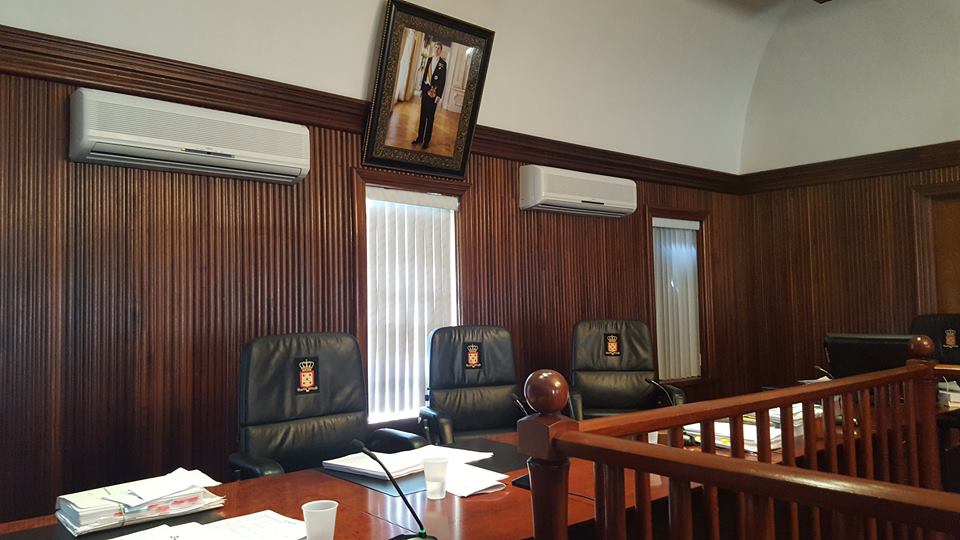Embezzling former courthouse branch manager has to pay back more than $1 million

PHILIPSBURG – The suspension and subsequent dismissal of the former branch manager of the courthouse in St. Maarten, Maritsa James-Christina, is justified, the Common Court of Justice said in a ruling dated January 21. James-Christina has to repay more than $1 million – money she embezzled between 2002 and 2017 from the court’s third party account.
It is unlikely the court will ever see all that money; at a pace of $500 a month in would take 169 years to repay everything and even with monthly installments of $2,000 it would take something like 42 years.
The Management Council of the Common Court of Justice announced an investigation into the financial management at the court in Philipsburg on November 24, 2017. The investigation –limited to the period 2013-2017 – began in December of that year, but the Common Court’s controller and an accountant from Ernst & Young got “little cooperation” though they soon found that the financial administration could not, or not completely, be found.
The investigators files two reports – one on March 12, 2018, and one on June 5 of that year. It appeared that between 2013 and 2017 money was taken out of the court’s third party account with 361 checks – the overwhelming majority in cash. All checks were signed by James-Christina and Leona Patrick. The investigators did not find any documentation to justify the withdrawals.
James-Christina maintained on several occasions that she had cashed the checks at the instruction of a former president of the court, Luis de Lannoy, who passed away in 2008 at the age of 57. She also claimed that the checks were cashed by a former bailiff who has in the meantime passed away as well. In the end, James-Christina wanted the court to believe, she gave the money at the backdoor of the courthouse to someone she did not know; she also did not know who instructed her to do this or who was entitled to the money.
Calculating the damages the court sustained from its embezzling branch manager – who may have a gambling addiction, since she was spotted on several occasions at the black jack tables in the Princess Casino – the appeals court limited it to amounts that occurred five times or more during the 2013-2017 period. For the period 2002-2012 the court included 18 cashes of $5,500 and 43 cashes of 5,500 guilders. All in all, it adds up to 204 checks for an amount of $1,148,160. Then the court excluded the 43 checks of 5,500 guilders because there is no evidence that James-Christina cashed them. That left total damages to be repaid for $1,015,295.
The court’s Management Council took swift action against James-Christina after the irregularities came to light. On January 28, 2018, it suspended her for a period of three months, starting on March 9; later it extended the suspension by a month. On May 28 the Management Council announced its intention to fire James-Christina and on June 22 the dismissal became a reality.
Two days earlier the council held James-Christina liable for the damages caused by her embezzlement and on July 6 it took away more than 29,500 guilders from her salary and fringe benefits as a form of advanced compensation.
The court qualified James-Christina’s defense against the accusations as lies that undermined the plausibility of any of her statements. She claimed for instance that part of the money and the administration disappeared during a burglary in 2007 and that other documents had been destroyed during Hurricane Irma in 2017. Not true, Judge Peter Lemaire declared under oath: the paperwork that got wet due to the hurricane was salvaged.
The court also pointed out in its ruling that no money could have been stolen during the burglary in 2007, because that money was in the bank.
There was still another weak point: the court ruled that it is “very unusual and unlikely to see regular withdrawals from the third party account for the same amounts of money.” Cash payments to those who are entitled to compensation are also unusual, the court found.
To cover up deficits in the third party account, James-Christina most likely moved money into it from the court fee account, the court ruled. After the court announced its investigation on November 24, 2011, no more money was withdrawn from the third party account.
“There is no dispute about the fact that these amounts were cashed by the plaintiff [James-Christina],” the court ruled. “There is however no proof for payment to others so the transactions end with her.”
The court declared all appeals against earlier rulings in this case by the Court in First Instance unfounded.
The criminal investigation and a civil lawsuit against the former branch manager are still pending.
###
Related article:
Opinion piece: Protect your assets


























